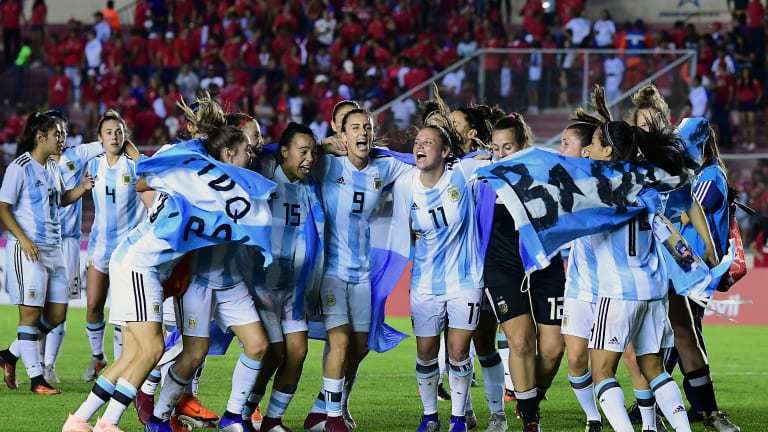The U.S. team isn’t the only women’s soccer team fighting for equality

When the first Argentinian women’s soccer league launched in 1991, the athletes involved were considered amateur and not paid. Almost 30 years later, they’re still unpaid, but that might soon change: Last March, President of the Argentine Football Association (AFA) Claudio "Chiqui" Tapia announced that the organization is taking steps to develop a professional women’s tournament.
This announcement comes on the heels of years of protests. The Argentinian women's soccer team went on strike in 2017 over the association’s refusal to pay for their travel, and in 2018, the players posed for a picture before a match with their hands on their ears to symbolically represent the association’s refusal to hear them.
Most recently, this past January, when Macarena Sánchez, a player for the team UAI-Urquiza, was fired, she took legal action against the club and the soccer association. She argued that she should be compensated for her work, and in doing so brought to light exactly how the system had worked for decades: They hired players not as athletes but as administrative workers for the club or companies linked to them. This meant that in addition to playing soccer, some women on these teams were also required to work in an office or coaching kids — like Eliana Medina, who worked in the club’s offices in the morning and coached girls futsal teams in the afternoons. Sánchez worked part time in an administrative position at a company with links to the directors of the club.
Not all players, however, were offered this deal and had to find other jobs to support themselves while also playing for the national team. Some ultimately had to leave the country to play for a professional soccer team abroad.
The association’s treatment of these female players, while problematic in and of itself, is also indicative of a bigger cultural problem with sexism in sports. The existence of girls’ and women’s sports teams is relatively new: Many female players didn’t have girls’ teams accessible to them to join as kids. Those who were, were often ridiculed; Belén Potassa, who now plays for the national team, remembers that she was called a tomboy by other kids who now, as adults, congratulate her.
This sexism is reflected in the media, too. When Adidas, the supplier of Argentina's official soccer jerseys, unveiled their new design 2018, they chose a fashion model to wear the women’s edition, but chose Lionel Messi, Argentina’s most popular professional player, to model the men's jersey.
In the past few months, Argentinian groups have been working to change these cultural attitudes. A feminist organization called Economía Femini(s)ta teamed up with Wikimedia and the Argentinian news outlet Red/Acción to launch Level the playing field — a campaign to promote cultural awareness of women in Argentinian soccer. They found that while more than 5,000 male Argentinian soccer players had Wikipedia profiles, only 33 Argentinian women soccer players did. So they gathered information about additional female players and hosted “edit-a-thons” to change that. A local chapter of Amnesty International organized a mixed soccer match with celebrities to show support for equality on and off the playing field, and the local congress of Buenos Aires, the biggest and most populated province in the country, also launched a campaign to tell the stories of many women soccer players over the years.
Also, an important newspaper in the country, La Nación, featured the players’ life stories in their Sunday magazine, and women team's victories were even published on the front page of Clarín, which usually only reports on the men ́s teams.
Now the state of Argentinian women’s soccer looks much different than it did even a few months ago. Nike and Adidas both published inspirational ads featuring the actual female players as their stars, and the AFA sponsored the team’s trip to France for the competition. The team has also captured the attention of a big audience: More than 1.6 million people watched their last World Cup match on TV.
During this World Cup, the Argentinian women’s team scored the first point ever on behalf of the nation in the competition against Japan. The team captain, Estefanía Banini, said: “It means a lot, it brings hope and it's the first step. It's what we wanted to show: the dedication and the struggle of the Argentinian women for equality.”
At the same time, these are still first steps toward victory — steps that were the result of a long fight. Even though the AFA will develop a professional tournament, for example, the association will only cover the salaries of eight players, and those professional players won’t be paid salaries comparable to those of their male counterparts. So while the fight for equality must continue, now people are paying attention — and hopefully their support will allow these women to shine.
More articles by Category: Sports
More articles by Tag: Equal Pay, Equality, Sexism, Discrimination



























